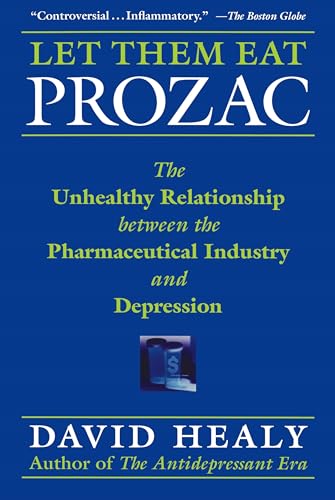Let Them Eat Prozac
The Unhealthy Relationship Between the Pharmaceutical Industry and Depression (Medicine, Culture, and History)
David Healy
BOOK REVIEW

In a world where mental health has become a pervasive concern, David Healy's Let Them Eat Prozac: The Unhealthy Relationship Between the Pharmaceutical Industry and Depression rips the veneer off the pharmaceutical industry's grip on depression treatment. This provocative work challenges us to confront the unsettling realities behind the medications that promise so much yet often deliver so little.
Healy, a psychiatrist with an academic pedigree that includes the University of Cardiff, navigates the treacherous waters where medicine and capitalism collide. It's not just another dry scholarly tome; it's a loud alarm bell, ringing relentlessly to awaken us from the pharmaceutical dream we've been sold over the decades. Can we honestly accept the idea that the same companies profiting from our suffering hold the keys to our recovery? This book doesn't shy away from asking the hard questions-questions that could rattle your very worldview.
Healy's narrative is a heart-wrenching critique of a system that has, to put it bluntly, medicalized human emotion. The very phrase "let them eat Prozac" suggests an absurd detachment from genuine compassion, and Healy explores this theme with disarming clarity. While the pharmaceutical industry has promoted antidepressants as a cure-all, Healy reveals a darker truth: these medications can often serve as a crutch, not a solution. The sobering reality is laid bare: what if the very drugs meant to uplift us are merely papering over the cracks of a system designed to profit from our despair?
Think about it-have you ever felt the weight of depression? Perhaps you've been prescribed a pill with the promise of relief, only to find it's a temporary fix that sidesteps deeper systemic issues. Healy dives into the murky waters of the patient-provider relationship, scrutinizing how our collective desperation has been exploited by an industry that thrives on fear. It's an electrifying exploration that demands your attention.
Much of Healy's critique resonates with the voices of readers who have encountered their own struggles with antidepressants. A common thread among reviewers is the sense of betrayal-an expectation of healing that turned into disillusionment. Many express anger at how these medications often exacerbate rather than alleviate their conditions. It is a sentiment that Healy deftly channels, pulling on the strings of our shared experiences with the healthcare system, laying bare the chaos woven into the fabric of our mental health struggles.
Set against the backdrop of the early 21st century, the book is rich with historical context. The rise of the antidepressant culture in the late 20th century coincided with an increase in diagnoses of depression and anxiety disorders. Healy deftly illustrates this connection, noting how societal factors-economic stressors, cultural stigmas, and a lack of awareness-have contributed to a perfect storm of mental health crises. Through statistics and anecdotes, we are left grappling with the ramifications: How did we allow ourselves to be swept into a whirlwind dictated by pharmaceutical profit margins?
The backlash against Healy's insights is equally revealing. Some critics argue he undermines the benefits of antidepressants for many patients, fostering unnecessary fear. They label him a renegade, suggesting his alarmist tone does more harm than good. Yet, isn't it vital to reevaluate the very foundation of our treatment approach instead of blindly following the status quo? Healy's work dares us to reflect critically on how we interpret mental health and the solutions we embrace.
At its core, Let Them Eat Prozac is not merely an indictment of the pharmaceutical industry; it is a clarion call for change-a passionate plea for the recognition of human suffering in a commercialized medical landscape. Healy compels us to imagine a new paradigm where mental health is treated holistically, where empathy is the catalyst for true healing, and where the focus shifts from profit to people. 🌍
The heart of Healy's thesis resonates with our collective yearning for authenticity in treatment. As we grapple with depression and its many faces, he invites us to reclaim ownership of our health. This book isn't just something to read-it's a movement in bulk, urging us to pull back the curtain on a system that has failed too many. If you're ready to confront the uncomfortable truths about mental health care, Let Them Eat Prozac may just be the eye-opening experience you didn't know you needed.
The choice is clear: continue to wander through the fog of depression under the heavy weight of corporate medicine, or stand up and demand better for yourself and those around you. The transformation starts with knowledge-and this book is your first bold step into the light. Are you ready to take it? 🌟
📖 Let Them Eat Prozac: The Unhealthy Relationship Between the Pharmaceutical Industry and Depression (Medicine, Culture, and History)
✍ by David Healy
🧾 351 pages
2006
#them #prozac #unhealthy #relationship #between #pharmaceutical #industry #depression #medicine #culture #history #david #healy #DavidHealy